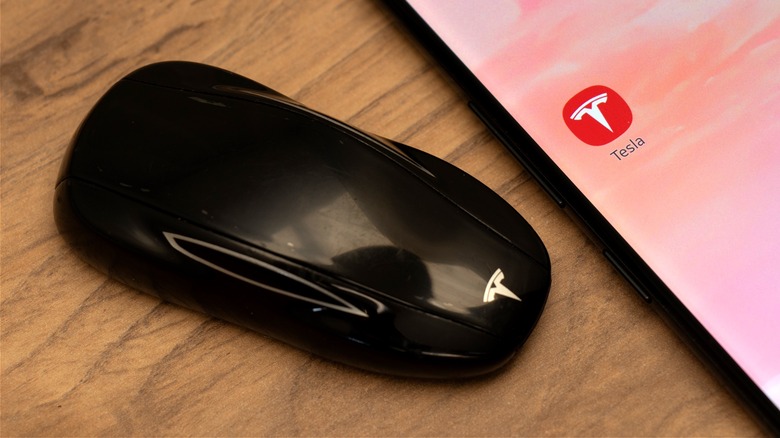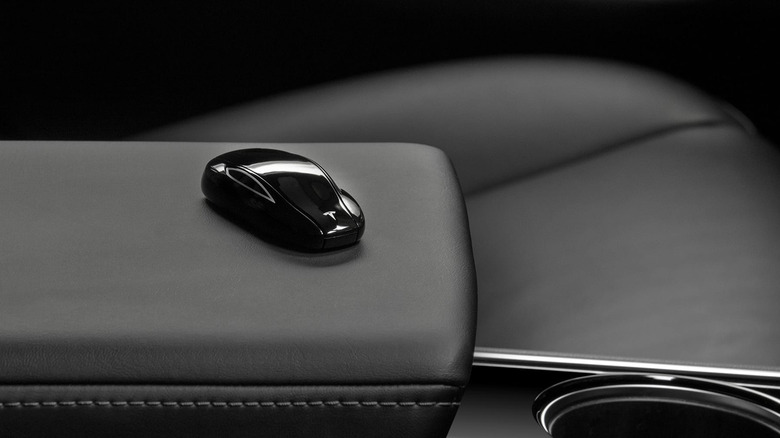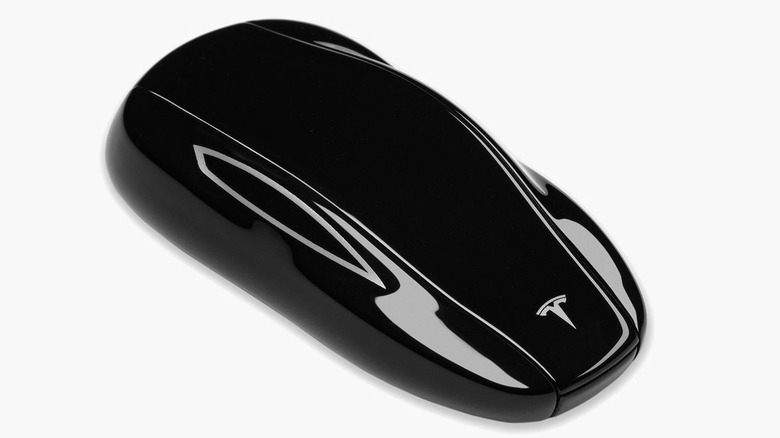Why You Won't Get A Key Fob With A New Tesla
It was July of last year that Tesla stopped offering a key fob with the Model S and Model X cars, shipping them only with the Key Card. However, the company hasn't put the device itself on cold ice. Interested customers can still buy the Tesla Key Fob for $175 a pop. The cheaper Model Y and Model 3 cars also followed a similar approach, apparently as a cost-cutting measure that curbs e-waste pile-up. Tesla, on the other hand, argued that customers wouldn't want to deal with a fob when the smartphone app offers the same convenience.
In an internal email seen by Drive Tesla, the carmaker mentioned that statistics suggest a majority of its customers actually use their smartphone to access their cars instead of the key fob. Tesla's move might not sit well with all its customers, especially for folks that really wanted the fob, but are now forced to pay a hefty sum for it. But the gradual removal of the key fob also makes sense from a convenience standpoint.
The convenience argument
In an era where keyless entry and start define the user-friendly engagement system, why would anyone want to carry another plastic gadget in their pockets. One can argue against the "phone as a key" solution that is gaining strong traction. What if the phone runs out of juice, or gets misplaced? Or if your Tesla car needs to be handled by a car valet? Well, for such scenarios, Tesla already offers the key card with its cars at no extra cost. It is slim, light, and slots in a wallet just like a typical credit or business card.
If one were to read the winds flowing at an industry, it's not just Tesla, but rivals that are also gravitating towards phone-based access solution for their cars owing, primarily because of the convenience aspect. For Tesla owners dreaming about the fob, they have no other option than paying a minimum of $150, depending on the Tesla model in their garage. Plus, it also happens to be more secure than the fob, so there's that. The move makes sense from a security perspective because the key fob offered by Tesla has been found to be vulnerable to attacks on multiple occasions in the past.
Some serious security consideration
Back in 2018, experts over at the KY Leuven University in Belgium demonstrated that the key fob shipped with the Tesla Model S is fairly easy to clone, allowing a bad actor to take off with a random target's car. The hardware cost to pull off the stunt was also quite low and ran into a few hundred dollars back then. Notably, the whole process to intercept and weaponise the cryptographic signal beamed by the key fob and decoding it took only a few seconds. Tesla promptly patched the vulnerability, but that was not the end of the story. A year later, researchers from the same institute documented more security vulnerabilities in the newer generation of Tesla key fobs.
Soon after the public disclosure, Tesla rolled out security updates the fix the flaw. It was also around the same time when Tesla, wary of the security risks, went from 40-bit to 80-encryption to protect the signals beamed by its key fobs. Tesla further boosted the safety aspect by introducing a PIN system to start and drive its electric cars. It's a step in the right direction, especially in the current landscape. Tesla is not exactly an apple of the regulators' eyes right now, especially after the smorgasbord of issues with its self-driving system and the safety hazards, working conditions, employee access to sensitive user data, and Musk's own personal conduct.


